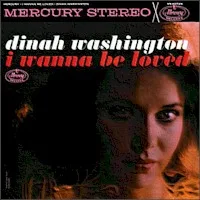Time: 32:12
Size: 73.7 MB
Styles: Jazz vocals
Year: 1962/2005
Art: Front
[2:42] 1. I Wanna Be Loved
[2:29] 2. Don't Explain
[2:28] 3. Everybody's Somebody's Fool
[3:01] 4. Invitation
[3:28] 5. You're Crying
[2:06] 6. Let's Fall In Love
[2:09] 7. When Your Lover Has Gone
[2:15] 8. A Stranger In Town
[2:44] 9. God Bless The Child
[3:19] 10. Blue Gardenia
[3:22] 11. I Can't Face The Music (Without Singing The Blues)
[2:04] 12. Sometimes I'm Happy
Hal Mooney (arranger) Joe Newman, Clark Terry (trumpet) Ernie Wilkins (trumpet, arranger) Jimmy Cleveland, Kai Winding (trombone) Billy Byers (trombone, arranger) Al Cohn (tenor saxophone, arranger) Patti Bown (piano) George Barnes (guitar) Art Davis (bass) Stu Martin (drums) Dinah Washington (vocals) The Dells (doo wop group) and others unidentified in orchestra, Quincy Jones (conductor). Recorded: in NYC, August 15th 1961 and NYC, September 13th 1961 and Chicago, IL, December 4th 1961.
A torch song date recorded between Dinah Washington's commercial breakthrough in 1959 and her death in 1963, I Wanna Be Loved flaunts a large cast of talented collaborators -- plus, to be sure, Washington's regal readings of 12 great songs -- but, unfortunately, the musical side is overwhelmed by the heavy strings in attendance. Working with Quincy Jones, Washington found her studio cast to include Joe Newman and Clark Terry on trumpet, Jimmy Cleveland and Kai Winding on trombone, and Al Cohn on tenor. However, the arrangements (from Ernie Wilkins and Quincy Jones) rarely leave room for the musicians -- and, in fact, rarely feature them at all -- preferring instead to concentrate on strings and the occasional wordless vocal chorus. As usually happened in these circumstances, Washington appears unfazed by the treacle surrounding her; although she doesn't improvise, her performances of "Blue Gardenia," "Don't Explain," and the title track (originally an R&B hit for her 12 years earlier) are elegant and bewitching. The larger big band makes its presence felt on the two side-closers, both of them ("Let's Fall in Love," "Sometimes I'm Happy") more uptempo material. Although Washington's latter-day Mercury material is often derided, she always succeeded despite her surroundings, and this date is no different. ~John Bush
A torch song date recorded between Dinah Washington's commercial breakthrough in 1959 and her death in 1963, I Wanna Be Loved flaunts a large cast of talented collaborators -- plus, to be sure, Washington's regal readings of 12 great songs -- but, unfortunately, the musical side is overwhelmed by the heavy strings in attendance. Working with Quincy Jones, Washington found her studio cast to include Joe Newman and Clark Terry on trumpet, Jimmy Cleveland and Kai Winding on trombone, and Al Cohn on tenor. However, the arrangements (from Ernie Wilkins and Quincy Jones) rarely leave room for the musicians -- and, in fact, rarely feature them at all -- preferring instead to concentrate on strings and the occasional wordless vocal chorus. As usually happened in these circumstances, Washington appears unfazed by the treacle surrounding her; although she doesn't improvise, her performances of "Blue Gardenia," "Don't Explain," and the title track (originally an R&B hit for her 12 years earlier) are elegant and bewitching. The larger big band makes its presence felt on the two side-closers, both of them ("Let's Fall in Love," "Sometimes I'm Happy") more uptempo material. Although Washington's latter-day Mercury material is often derided, she always succeeded despite her surroundings, and this date is no different. ~John Bush
I Wanna Be Loved


